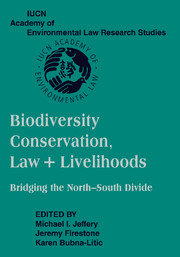 Biodiversity Conservation, Law and Livelihoods: Bridging the North-South Divide
Biodiversity Conservation, Law and Livelihoods: Bridging the North-South Divide Published online by Cambridge University Press: 31 July 2009
INTRODUCTION
At its General Assembly in 2000, the World Intellectual Property Organization (WIPO) proposed the constitution of a special taskforce to look into intellectual property issues arising from the exploitation of genetic resources, traditional knowledge, and expressions of folklore at the request of its Member States. This resulted in the establishment of the Intergovernmental Committee on Intellectual Property and Genetic Resources, Traditional Knowledge and Folklore (IGC), which has spearheaded WIPO's exploratory efforts in shaping an international response to the misappropriation of these resources to develop products over which intellectual property rights are secured. Five years later, thousands of pages of text have been produced in a plethora of discussion materials, consultation papers, technical reports, survey result compilations, and numerous document drafts by the IGC and the WIPO Member States, which have responded to its calls for participation in the international process. Having held eight official sessions to analyse and discuss the intellectual property issues that have arisen in the context of these topical controversies, what progress has the IGC achieved in reaching a global consensus on the Intellectual Property community's response to these issues?
This chapter seeks to distil the output generated by the IGC and to evaluate the draft recommendations it has put forward in its recent sessions, identifying the key developments that have occurred at this forum and the directions in which they appear to be heading.
To save this book to your Kindle, first ensure [email protected] is added to your Approved Personal Document E-mail List under your Personal Document Settings on the Manage Your Content and Devices page of your Amazon account. Then enter the ‘name’ part of your Kindle email address below. Find out more about saving to your Kindle.
Note you can select to save to either the @free.kindle.com or @kindle.com variations. ‘@free.kindle.com’ emails are free but can only be saved to your device when it is connected to wi-fi. ‘@kindle.com’ emails can be delivered even when you are not connected to wi-fi, but note that service fees apply.
Find out more about the Kindle Personal Document Service.
To save content items to your account, please confirm that you agree to abide by our usage policies. If this is the first time you use this feature, you will be asked to authorise Cambridge Core to connect with your account. Find out more about saving content to Dropbox.
To save content items to your account, please confirm that you agree to abide by our usage policies. If this is the first time you use this feature, you will be asked to authorise Cambridge Core to connect with your account. Find out more about saving content to Google Drive.